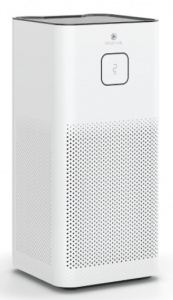
Air purifiers are fantastic tools to clear unpleasant contaminants that can cause asthma and allergies. People ask, “Can an air purifier make you sick?”
When you turn on your air purifier, do you experience headaches, asthma attacks, or other respiratory irritation? You are right. Running an air purifier can cause allergic reactions. But not any purifier; the culprit is a purifier with ionization or UV-C purification mechanism.
But you do not have to worry. For your safety, take a look at why your air purifier irritates you.
Types of Air Purifiers
Air purifiers have different sizes and purification mechanisms. Some manufacturers create stand-alone to large industrial air purifiers. But for purification mechanisms, companies have specialized in making purifiers that clean air using filters and others using ionization and UV-C systems.
This article highlights the most used systems and points out those that can make you feel sick.
HEPA air purifiers
A great air purifier improves your air quality by reducing smoke, dust, mold, and pet dander. But an excellent air purifier needs to be affordable, powerful, and quiet enough when providing quality air in your home.

HEPA air purifiers are well advanced to clean up to 99.7% of airborne particles larger than 0.2 microns from the air in your home. The HEPA technology devices only absorb irritating particles from the air with no side effects to the user.
Ultraviolet air purifiers
Ultraviolet purifiers use UV light technology to kill viruses, pathogens, and bacteria in your office or home space. The devices kill up to 99.99% of mold and germs, which helps to prevent illnesses. However, the purifiers are not effective in removing volatile organic compounds from the air.
UV or UV-C air purifiers are also called filterless air purifiers. They are the easiest and cheapest to maintain because you don’t need to wash or replace filters.
However, UV air purifiers emit ozone. If your purifier emits ozone are likely to suffer from respiratory irritation, and if you are asthmatic, you may get attacks. As per Environmental Protection Agency (EPA), you should not purchase an air purifier that emits ozone.
Ozone pollution causes:
- Coughing
- Sore throat
- Lung inflammation
- Asthma attack
- Worsening lung diseases
Activated carbon air purifier filters
Purifiers with activated carbon filters effectively remove smoke, odors, fumes, and volatile gases from your home. Therefore, if you are sensitive to smoke and other gases, you should consider purchasing this device.
It is also worth noting that carbon filters do not use UV or ionic purification mechanisms which release ozone into your home. However, activated carbon is usually used together with HEPA filters rather than in isolation.
Ionic air purifiers
Ionic air purifiers (or ionizers) operate without a motor, making them very quiet. The purifier releases negative ions into the air, attracting positively charged airborne pollutants, making them heavy that they fall on the ground.
Although the purifiers work efficiently, they release ozone into the air. The ozone causes throat irritation, coughing, shortness of breath, and asthmatic attacks.
Final Thoughts
This information clarifies that ionic and UV-C air purifiers could cause some respiratory issues. However, some people using filter technologies air purifiers feel sick even when their purifiers are on. It means that their air purifiers are not efficient enough to remove all allergens from the air in their homes.
We recommend cleaning the washable filters or replacing the non-washable ones. Further, you should check if the air purifier can handle the space range of your home.